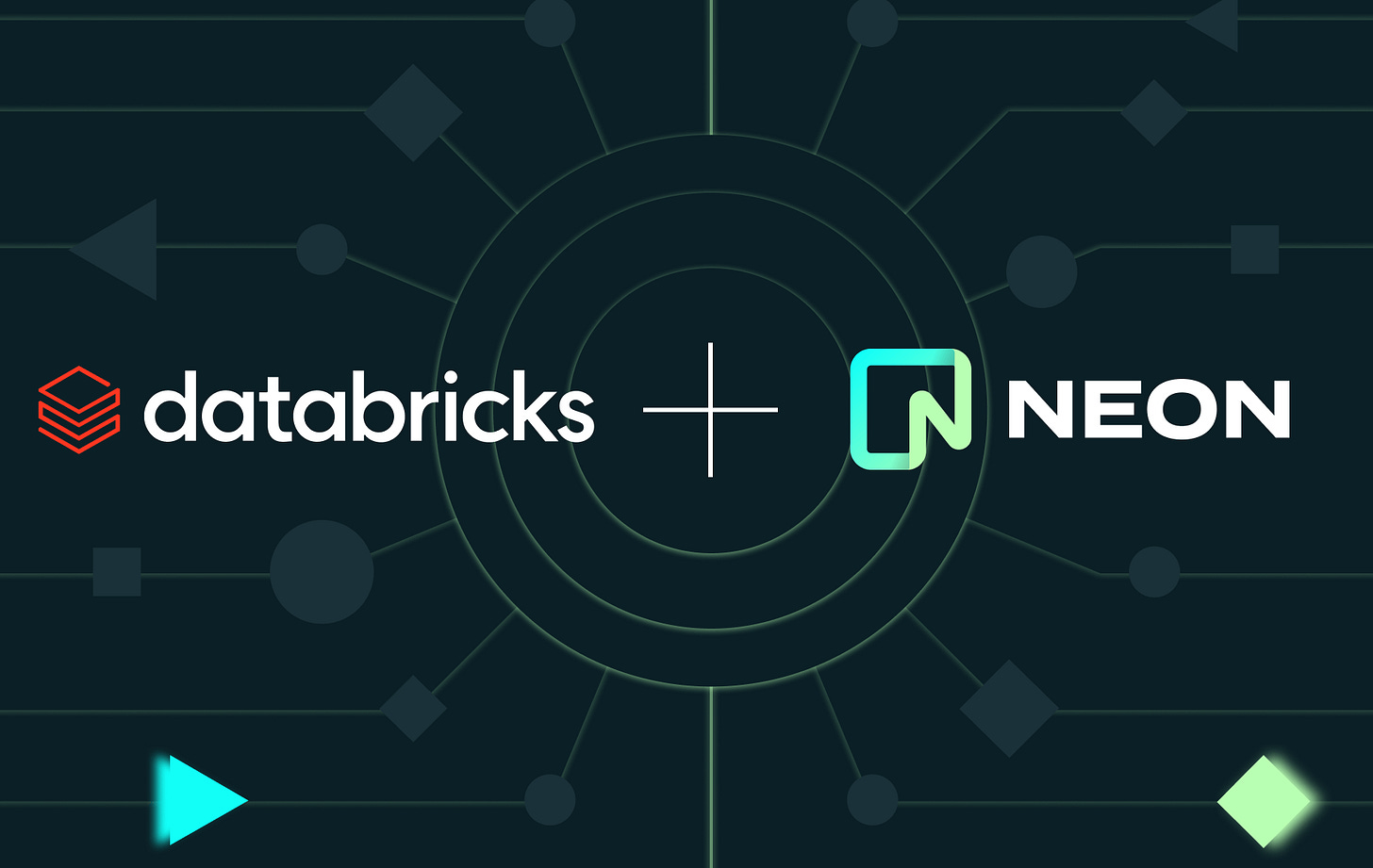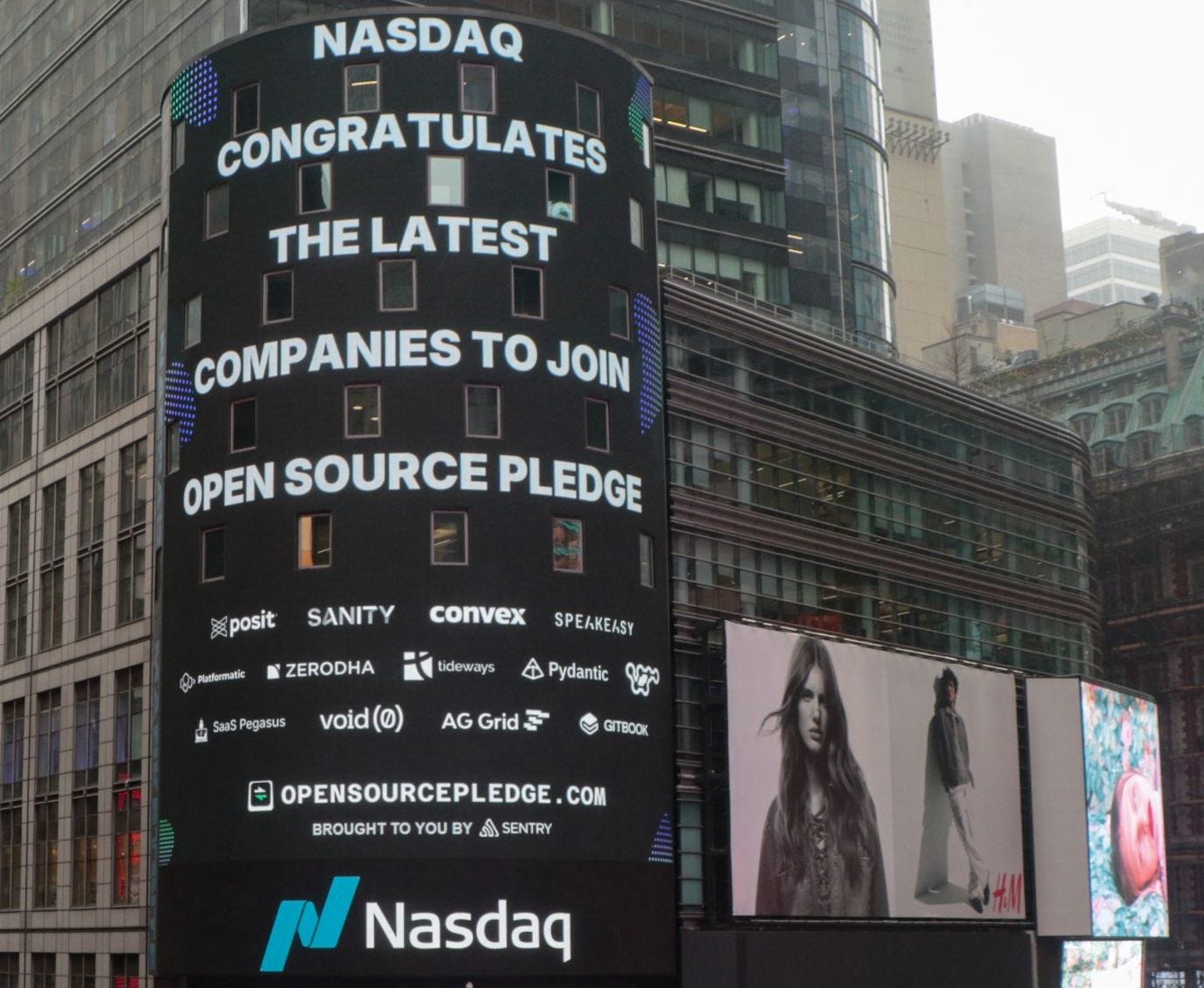Databricks digs deep for open source database startup Neon
Plus: Sysdig donates Stratoshark to the Wireshark Foundation
In issue #17 of Forkable, I look at Databricks’* $1 billion acquisition of open source database startup Neon.
*Yes, this post did originally say Datadog — a big uh-oh on my part, apologies — hence why I’m sending this again.
Elsewhere, COSS Corner this week profiled a conference targeted specifically at commercial open source company founders; I look at Sysdig donating Stratoshark to the Wireshark Foundation; Microsoft's layoffs hitting Python community; and more.
As usual, feel free to reach out to me with any questions, tips, or suggestions: forkable[at]pm.me.
Paul
Open issue
Databricks digs deep for Neon
Databricks has confirmed plans to acquire Neon, a serverless open source alternative to AWS Aurora Postgres.
As I mentioned briefly in last week’s Forkable, ex-Forbes writer Alex Konrad, now heading up his own media outlet Upstarts, scooped the upcoming acquisition, with Konrad reporting that Databricks was set to table a $1 billion bid for Neon.
That news became official during the week, and the deal is expected to close following the usual closing conditions and regulatory red-tape.
Founded in 2013, Databricks has emerged as a $62 billion enterprise juggernaut for its cloud-based data platform that helps organizations manage big data and build, train, and deploy AI models at scale.
Neon, for its part, is a four-year-old startup that provides a fully managed platform to create and manage PostgreSQL databases. Developed under an Apache 2.0 license, the core Neon engine decouples storage and compute, which allows for greater flexibility and efficiency.
The rise of agentic AI has created fertile ground for Neon to flourish. AI agents are essentially independent systems that carry out specific actions and make decisions off their own volition — this relies heavily on being able to access structured, reliable, real-time data. And being able to create databases itself enables agents to easily store information it generates or collects, without needing human intervention.
The long and short of all this is that Neon is well-positioned to serve as the foundational data infrastructure for AI agents to operate autonomously at scale: the company reports that more than 80 percent of the databases provisioned on Neon were created by AI agents. And that was the big selling point for Databricks.
“The era of AI-native, agent-driven applications is reshaping what a database must do,” Databricks co-founder and CEO Ali Ghodsi said in a statement. “Neon proves it: four out of every five databases on their platform are spun up by code, not humans. By bringing Neon into Databricks, we’re giving developers a serverless Postgres that can keep up with agentic speed, pay-as-you-go economics and the openness of the Postgres community.”
Read more: Databricks and Neon will deliver serverless Postgres for developers and AI agents
COSS Corner
An open source conference… for open source founders?
Anyone who follows the open source “industry” will know of the multitude of conferences that exist in the domain. To highlight a few: the State of Open Con, KubeCon / CloudNativeCon, the Linux Foundation’s various regional Open Source Summits, FOSDEM, All Things Open, OpenSearchCon, and all the other broad and niche events.
Yes, “open source” is well covered in terms of global gatherings. However, while these kinds of events may dedicate some time to the business side of open source, they typically focus more on the technology or community-management side of things, rather than the pain-points faced by commercial open source companies specifically.
And so in this week’s edition of COSS Corner, I caught up with Emily Omier, open source company consultant; and Remy Bertot, co-founder and CTO of open source password management platform Passbolt. Last year, the duo joined forces to launch the inaugural Open Source Founders Summit (OSFS), an event aimed squarely at open source company founders. With the second OSFS conference coming up in Paris next week, I wanted to find out a little more about the event, including its evolution and how it’s looking to set itself apart from the myriad other open source-aligned events out there.
“I go to a lot of open source conferences, and while there would sometimes be a ‘business’ track, it was at best full of entry-level talks — think ‘open source business models’,” Omier told me. “There was no place for in-depth discussions about what makes open source businesses different, and never anything that I thought would be useful to my clients, who are by definition ‘experienced’ in open source businesses, because they have been running an open source business for at least some time.”
That is the gap that the OSFS is striving to fill — it’s a “business conference, not a technology conference,” as Omier puts it.
Read more: The Open Source Founders Summit is a 'business conference, not a technology conference'
Patch notes
Stratoshark joins sibling at the Wireshark Foundation
Cloud security company Sysdig has donated its open source system call and log analyzer Stratoshark to the Wireshark Foundation.
Sysdig launched Stratoshark back in January, designed to extend the functionality of Wireshark to cloud-native environments. Wireshark, for the uninitiated, is a network protocol analyzer — a tool for inspecting data packets that travel over a network in real time. This allows companies to troubleshoot network issues, or analyze suspicious activity, for example.
Stratoshark was developed by Wireshark founder Gerald Combs, who has served as Sysdig’s director of open source projects since 2021; and Sysdig founder and CTO Loris Degioanni, who also created the open source runtime security tool Falco, now part of the Cloud Native Computing Foundation.
Wireshark is already hosted by the Wireshark Foundation, a not-for-profit that includes members such as Google, Veeam, and Sysdig itself. So it makes some sense that Stratoshark has now joined its sibling at the Foundation.
“At Sysdig, we fundamentally believe that security should be a collaborative, transparent effort for defenders – not an asymmetrical battle,” Degioanni said in a statement. “That belief was the foundation for Wireshark and Falco, and it’s the guiding principle that led us to create Stratoshark. By donating Stratoshark to the Wireshark Foundation, we’re ensuring that the community can continue to innovate, refine, and strengthen security together.”
Read more: Sysdig donates Stratoshark to the Wireshark Foundation to advance open source cloud security
Microsoft layoffs hit Python
Microsoft announced it was laying off some 6,000 employees this week, representing 3% of its workforce. According to Bloomberg, coders bore the brunt of the cull, and as things later transpired, this also included a team of developers focused on CPython — the default (and most widely used) implementation of Python.
More specifically, Microsoft employed some of the key contributors to Faster CPython, a project focused on making CPython faster.
As per CPython core developer Mike Droettboom: “It's been a tough couple of days. Microsoft's support for the Faster CPython project was canceled yesterday, and my heart goes out to the majority of the team that was laid off. A hard day for me, but even harder for others.”
Data protection with an open source flavour
Plakar, a French startup developing an open source data backup and restore platform, announced it has raised $3 million in a pre-seed round of funding led by Seedcamp to support the formal stable release of its core product.
“With Plakar, we’re providing an open-source solution that simplifies backup and restore processes while making enterprise-grade data resilience accessible to businesses of all sizes,” Plakar co-founder and CEO Julien Mangeard said.
The company quietly announced all this on its own blog earlier this month, and you can read all about it in the link below.
Read more: Introducing Plakar v1.0 to redefine Open-Source Data Protection with $3M funding
Benioff: Open source is the ‘driver of innovation’
Marc Benioff had a lot to say about artificial intelligence in a Financial Times interview published this week. The billionaire Salesforce co-founder and CEO also waxed lyrical about the role that open source has played in getting AI to where it is today — and also the role it’s playing in accelerating innovation in an area that is becoming increasingly commoditized.
“AI has got to where it is over the last two decades through open source,” Benioff said. “Salesforce is a huge contributor to the body of work, including the prompt engineering and other critical parts of these model technologies. Open source has made all of this possible. It is the driver of the innovation.”
Canonical’s $120K commitment to open source devs
Canonical, creator and core sponsor of Linux distribution Ubuntu, announced this week that it’s committing $120,000 to open source developers over the next 12 months, using Thanks.dev to determine how the money is split.
Read more: Canonical + thanks.dev = giving back to open source developers
And finally… the Open Source Pledge hits the NASDAQ
Back in November, I wrote a piece on TechCrunch looking at the various equity-free funding initiatives springing up around open source projects. Among those is the Open Source Pledge, a program spearheaded by developer tooling company Sentry to encourage regular financial commitments to open source projects.
This week, Sentry’s head of open source Chad Whitacre posted this little nugget to LinkedIn: the Open Source Pledge, and the latest companies to sign up, displayed on the NASDAQ’s famous Times Square LED display.
May is Maintainer Month, after all, so what better time?



